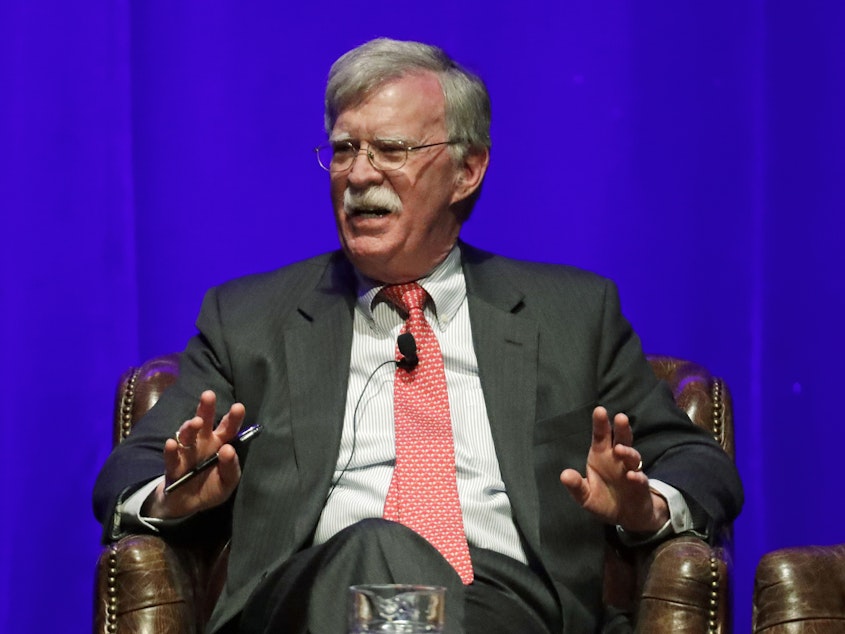Justice Department Seeks To Block Publication Of John Bolton's White House Memoir

Seven days before the scheduled June 23 release of a tell-all account of John Bolton's tenure as President Trump's national security adviser, the Justice Department late Tuesday mounted a last-ditch effort to block its publication.
A 27-page civil lawsuit filed by the Justice Department against Bolton with the U.S. District Court for the District of Columbia alleges that publication of his 592-page book, The Room Where It Happened, would be a violation of nondisclosure agreements he signed and compromise national security.
"[The National Security Council] has determined that the manuscript in its present form contains certain passages — some up to several paragraphs in length — that contain classified national security information," the filing states. "In fact, the NSC has determined that information in the manuscript is classified at the Confidential, Secret, and Top Secret levels."
"Accordingly," it continues, "the publication and release of The Room Where it Happened would cause irreparable harm, because the disclosure of instances of classified information in the manuscript reasonably could be expected to cause serious damage, or exceptionally grave damage, to the national security of the United States."
The lawsuit argues that Bolton, who lasted 16 months as Trump's third national security adviser before being fired in September 2019, had signed a document three days after leaving his White House post acknowledging "that he continued to be 'prohibited from disclosing any classified or confidential information,' and that he 'may not use or disclose nonpublic information' — defined as 'information gained by reason of [his] federal employment' and that 'has not been made available to the general public.' "
Bolton is accused in the lawsuit with three counts of breach of contract and fiduciary duty — for allegedly violating prepublication review requirements, for violating his duty not to disseminate classified information, and for unjust enrichment from what the Justice Department says is a book deal "allegedly worth about $2 million."
The court is asked to order Bolton to request that the book's publisher, Simon & Schuster, further delay a publication date that originally was to have been in April so that the NSC can complete its prepublication review. No time frame is given for how soon that review might be finished.
According to a director with Bolton's Foundation for American Security and Freedom super PAC, the former U.S. ambassador to the United Nations on Tuesday evening had no comment to make about the lawsuit.
In an email, his attorney, Charles Cooper, said, "We are reviewing the Government's complaint, and will respond in due course."
A statement sent to NPR Monday night by the book's publisher slammed the Trump administration's civil complaint against its author. "The lawsuit filed by the Department of Justice to block John Bolton from publishing his book, THE ROOM WHERE IT HAPPENED, is nothing more than the latest in a long running series of efforts by the Administration to quash publication of a book it deems unflattering to the President," wrote Adam Rothberg, a Simon & Schuster spokesman. "Ambassador Bolton has worked in full cooperation with the NSC in its pre-publication review to address its concerns and Simon & Schuster fully supports his First Amendment right to tell the story of his time in the White House to the American public."
It appears, though, that Bolton's book has already been printed and is being distributed.
"In the months leading up to the publication of The Room Where It Happened, Bolton worked in cooperation with the National Security Council to incorporate changes to the text that addressed NSC concerns," Simon & Schuster said in a June 10 press release. "The final, published version of this book reflects those changes, and Simon & Schuster is fully supportive of Ambassador Bolton's First Amendment right to tell the story of his time in the Trump White House."
A description by the publisher of what the mustachioed, hard-driving former top aide to Trump has written leaves little doubt why the president, with Attorney General Bill Barr at his side, said on Tuesday of Bolton "maybe he's not telling the truth. He's been known not to tell the truth a lot."
In that prepublication blurb, Simon & Schuster quotes a damning indictment of Trump directly from Bolton's book.
"'I am hard-pressed to identify any significant Trump decision during my tenure that wasn't driven by reelection calculations,' he writes," according to the publisher.
"In fact," Simon & Schuster says of Bolton, "he argues that the House committed impeachment malpractice by keeping their prosecution focused narrowly on Ukraine when Trump's Ukraine-like transgressions existed across the full range of his foreign policy — and Bolton documents exactly what those were, and attempts by him and others in the Administration to raise alarms about them."
The book, the imprint adds, "shows a President addicted to chaos, who embraced our enemies and spurned our friends, and was deeply suspicious of his own government."
Bolton's book sales, should the eleventh-hour effort to block them fail, could handsomely benefit from the considerable publicity generated by his spat with Trump.
Should that happen, the lawsuit contends, the earnings would not go to Bolton.
It claims that under the nondisclosure agreements he signed, Bolton agreed to "assign to the United States Government all rights, title, and interest, and all royalties, remunerations and emoluments that have resulted or will result or may result from any disclosure, publication or revelation not consistent with the terms" of those agreements. [Copyright 2020 NPR]



